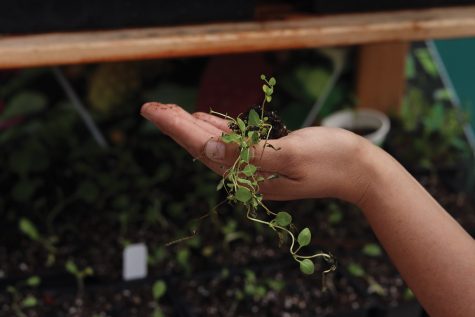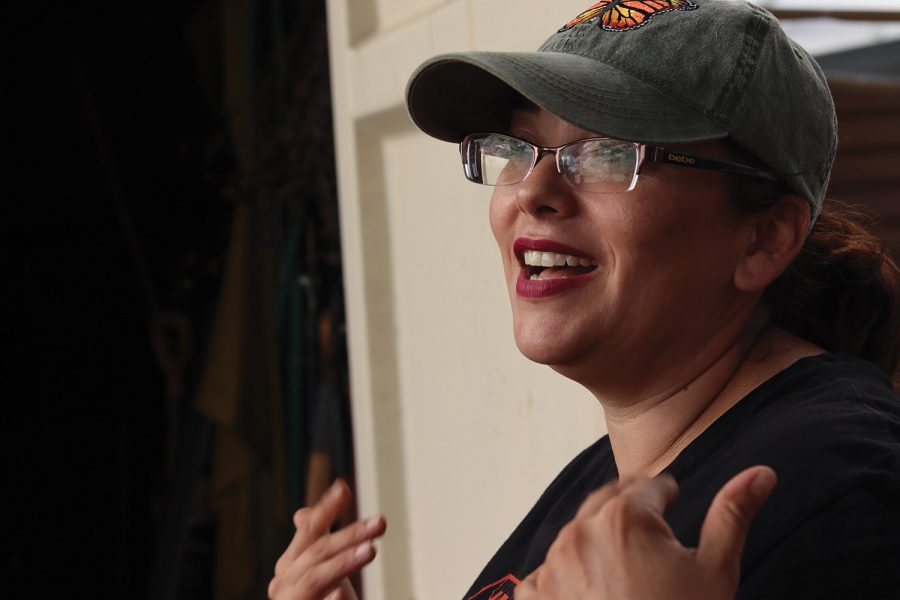Mabel Trigueros, the institute garden coordinator, first started working with the garden this past summer through Agroecology, Farming, and Food Pathway, a program offered by CSUN’s Institute of Sustainability. AFFP partners with Multinational Exchange for Sustainable Agriculture to offer a three-month long certificate program, providing participants with hands-on training in farming.
A Sustainable Path for CSUN Students
November 1, 2021
Tucked away behind the baseball field near student housing lives CSUN’s food garden, which has transformed from a patch of dirt into a home for nearly 65 fruit trees and 200 native plants.
It was established in 2010 when students, faculty, staff, alumni and community members recognized the need to provide a food space. The garden is all organic and does not use any pesticides or synthetic fertilizers, and creates its own compost — or black gold as those in the gardening community like to call it — which provides minerals and foods for the plants.
Mabel Trigueros is the institute garden coordinator and first started working with the garden this past summer through Agroecology, Farming, and Food Pathway, a program offered by CSUN’s Institute of Sustainability. AFFP partners with Multinational Exchange for Sustainable Agriculture to offer a three-month long certificate program, providing participants with hands-on training in farming.

“I enrolled in the certificate program because I’ve always been into gardening and it’s just like one of my passions,” Trigueros said. She was soon offered the facilitator role for the program before signing on for the administrative role she has today with the Institute of Sustainability. Trigueros’ favorite part of her role is getting to grow the food, and she has a particular pride with the peppers she’s grown.
The garden rotates the food they grow with its corresponding seasons to produce optimal produce. “Yes, you can get tomatoes year round, but are those tomatoes really the best? They’re not,” Trigueros said. “When you have an heirloom tomato that [is] grown in season and [at] the right time, there’s no taste to compare.”
By growing produce in season, the garden is able to provide a healthy and organic food source to students on campus. While the garden operates at a small scale, any abundance of produce is donated to the CSUN food pantry.
Another focus of the garden is to educate students on how they can grow food and see firsthand where it comes from. The garden is open to volunteers every Tuesday and Thursday from 9 a.m. to 1 p.m., and has just started offering Saturdays as an option as well. Tasks range from weeding and watering to harvesting the produce.
The institute also organizes orange picks, where volunteers come to the Orange Grove to pick up oranges that are later donated to local food pantries.
Since it first began in 2008, the Institute for Sustainability has aimed to educate the campus and greater Northridge community about how they can practice sustainability in their day-to-day life. CSUN offers a minor in sustainability for students. In addition, CSUN now offers a master’s degree in sustainability, one of only a handful of CSUs to do so. Its first cohort of students will start in fall 2022.
CSUN was also the first CSU to build a Certified LEED Platinum Sustainability Center, where the Institute of Sustainability operates out of. The building is a testament to the campus’s commitment to sustainability because of the features built into its structure, such as gray water irrigation, a solar-paneled roof and utilizing natural ventilation.
Natale Zappia, the director of the Institute for Sustainability, is now in his third year with the program. Zappia describes the position as his dream job as he’s able to focus on his main interests, such as urban farming, community gardening and environmental education, while also teaching history at CSUN.
Zappia offered encouraging advice to those looking to begin their journey with sustainability. For starters, they shouldn’t begin by feeling guilty. “Sustainability is about sustaining yourself, it starts with yourself,” he said.
The institute works closely with CSUN’s Associated Students sustainability program. AS organizes events and resources focused on sustainability, such as an E-Waste Drive, which helps students safely recycle old electronics.
New this year is the Matador Exchange program which operates as an online marketplace exclusively for CSUN students. The marketplace connects students looking to buy secondhand items including textbooks, clothing and furniture. By only being available to CSUN students, the market also relieves students of the nerves that might come from purchasing items on other exchange sites such as craigslist.
CSUN will soon be home to a freight farm, a shipping container with two acres worth of farmland inside. Campus facilities were approved for a grant that provides funding for the farm, which is designed to help students and provide for those who experience food insecurity.
The shipping container provides protection for the plants by keeping away rodents that the food garden has had to learn to live with.
“It’s an uphill battle with squirrels and rabbits,” said Trigueros, as a squirrel made its way through the garden. “They’re a part of the system here and it’s like okay, fine. So when we plant stuff it’s like we know we have to plant like 10 times more whatever it is because the harvest we’re going to get, we’re going to lose it to them.”
There’s other initiatives on the horizon for the Institute for Sustainability. The garden began building their own seed bank this summer. After taking seed donations, they allow their plants to bolt so that they grow flowers and produce seeds of their own.
Trigueros recognized that it’s not uncommon for students to feel discouraged from gardening because they feel they might not have the yard or space for it, but she believes that doesn’t prevent them from getting started. “If you have a window ceiling, if you have access to a container, you have access to light, you have access to water, guess what? You’re going to be able to grow — at the minimum — at least herbs, so why not incorporate some fresh herbs into your diet?”
It’s a similar sentiment echoed by Zappia, who recommended students to start by finding simple ways to incorporate sustainability into their everyday routine. He believes that starting with tasks that are within reach allows people to enter sustainability from a healthier mindset, rather than guilt. “I mean guilt does motivate people,” Zappia said. “But I don’t think it’s, in the end, the most effective way to get us to regenerative culture, which is what we need to tackle these ecological issues.”
